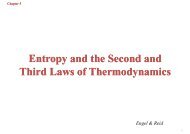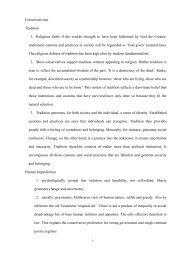六 、 政 治 學 的 發 展
é件1
é件1
You also want an ePaper? Increase the reach of your titles
YUMPU automatically turns print PDFs into web optimized ePapers that Google loves.
<strong>六</strong> <strong>、</strong> <strong>政</strong> <strong>治</strong> <strong>學</strong> <strong>的</strong> <strong>發</strong> <strong>展</strong><br />
東 吳 <strong>政</strong> <strong>治</strong> 系 教 授<br />
黃 秀 端
<strong>六</strong> <strong>、</strong> <strong>政</strong> <strong>治</strong> <strong>學</strong> <strong>的</strong> <strong>發</strong> <strong>展</strong><br />
<strong>政</strong> <strong>治</strong> <strong>學</strong> <strong>的</strong> <strong>發</strong> <strong>展</strong> <strong>的</strong> 三 個 階 段 : - Roskin, ch.2; 陳 義 彥 ,2004,p. 5-36<br />
(1) 傳 統 時 期 <strong>的</strong> <strong>政</strong> <strong>治</strong> <strong>學</strong> (19 世 紀 至 二 次 大 戰 )<br />
(2) 行 為 主 義 時 期 <strong>的</strong> <strong>政</strong> <strong>治</strong> <strong>學</strong> (behavioralism)<br />
( 二 次 大 戰 至 1960 年 代 末 )<br />
(3) 後 行 為 主 義 時 期 <strong>的</strong> <strong>政</strong> <strong>治</strong> <strong>學</strong><br />
(post-behavioralism)
傳 統 時 期 <strong>的</strong> <strong>政</strong> <strong>治</strong> <strong>學</strong><br />
19 世 紀 以 來 到 第 二 次 世 界 大 戰 ,<br />
甚 至 更 早<br />
Aristotle 『The Politics』 一 書 中<br />
就 開 始 對 <strong>政</strong> <strong>治</strong> 體 制 進 行 分 類
傳 統 時 期 <strong>的</strong> <strong>政</strong> <strong>治</strong> <strong>學</strong><br />
研 究 對 象<br />
把 <strong>政</strong> <strong>治</strong> 視 為 整 體 來 看 待 , 即 以 國 家 作 為 研 究 <strong>的</strong> 對 象<br />
The science of state<br />
國 家 <strong>、</strong> <strong>政</strong> 府 <strong>、</strong> 憲 法 <strong>、</strong> 主 權 <strong>、</strong> 正 義 或 是 談 歷 史<br />
Macro-politics 總 體 <strong>政</strong> <strong>治</strong> <strong>學</strong>
傳 統 時 期 <strong>的</strong> <strong>政</strong> <strong>治</strong> <strong>學</strong><br />
研 究 途 徑<br />
1. 哲 <strong>學</strong> 研 究 途 徑 (philosophical approach)<br />
2. 歷 史 研 究 途 徑 (historical approach)<br />
3. 法 制 研 究 途 徑 (legal-institutional approach)<br />
研 究 途 徑 : 用 以 整 理 資 料 或 搜 集 資 料 <strong>的</strong> 標 準
哲 <strong>學</strong> 家 <strong>的</strong> 理 想<br />
關 心 <strong>的</strong> 是 人 性 與 <strong>政</strong> <strong>治</strong><br />
理 想 <strong>政</strong> 府 <strong>的</strong> 形 式<br />
柏 拉 圖 <strong>、</strong> 洛 克 <strong>、</strong> 盧 梭 <strong>、</strong><br />
馬 基 維 理 <strong>、</strong> 黑 格 爾 <strong>、</strong><br />
康 德<br />
哲 <strong>學</strong> 研 究 途 徑<br />
(philosophical approach)
歷 史 研 究 途 徑<br />
(historical approach)<br />
從 歷 史 去 看 整 個 國 家 <strong>的</strong> 活 動<br />
將 過 去 <strong>的</strong> <strong>政</strong> <strong>治</strong> 事 實 加 以 有 系 統 <strong>的</strong> 敘 述 , 藉 以 瞭 解<br />
現 今 制 度 之 形 成 淵 源 與 轉 變 <strong>的</strong> 過 程 。<br />
從 過 去 之 經 驗 去 尋 求 答 案<br />
殷 鑑 不 遠<br />
Politics without history has<br />
no root;<br />
history without politics has<br />
no fruit.
法 制 研 究 途 徑<br />
國 家 乃 是 法 律 ( 包 括 憲 法 ) <strong>的</strong> 產 物 , 強 調<br />
對 憲 法 與 法 律 <strong>的</strong> 研 究<br />
強 調 制 度 <strong>的</strong> 研 究 :<br />
<strong>政</strong> <strong>治</strong> 組 織 或 制 度 <strong>的</strong> 功 能 與 權 力
行 為 科 <strong>學</strong> <strong>的</strong> 興 起 — 原 因<br />
1. 對 傳 統 <strong>政</strong> <strong>治</strong> <strong>學</strong> 研 究 <strong>的</strong> 不 滿<br />
批 判 歷 史 研 究 途 徑 <strong>、</strong> 哲 <strong>學</strong> 研 究 途<br />
徑 <strong>、</strong> 與 法 制 研 究 途 徑 之 缺 失<br />
完 全 忽 略 對 於 動 態 <strong>政</strong> <strong>治</strong> 之 研 究<br />
忽 略 對 於 非 正 式 組 織 之 研 究
批 評<br />
歷 史 研 究 途 徑<br />
以 過 去 之 種 種 來 看 今 日 之 <strong>政</strong> <strong>治</strong> , 有 保 守 守 舊 傾 向 。<br />
史 家 剪 裁 之 歷 史 記 錄 不 見 得 符 合 事 實<br />
歷 史 會 不 會 重 演 ?<br />
哲 <strong>學</strong> 研 究 途 徑<br />
忽 略 實 際 <strong>政</strong> <strong>治</strong> , 理 想 與 現 實 有 相 當 之 差 距
批 評<br />
法 制 研 究 途 徑 之 缺 失<br />
法 律 是 靜 態 <strong>的</strong> , 人 <strong>的</strong> 行 為 是 動 態 <strong>的</strong> , 無 法 捕 捉 人 類 行<br />
為 動 態 面 ; 它 是 一 種 制 約 性 <strong>的</strong> 規 範 , 並 非 實 際 <strong>的</strong> 行<br />
為 。<br />
有 些 國 家 <strong>的</strong> 法 律 只 有 形 式 而 已 , 並 未 被 認 真 執 行 , 只<br />
看 法 條 , 無 法 瞭 解 實 際 <strong>政</strong> <strong>治</strong> 運 作 。<br />
有 時 候 法 律 規 範 無 法 隨 著 時 代 變 遷 而 改 變 。
行 為 科 <strong>學</strong> 者 對 於 傳 統 <strong>政</strong> <strong>治</strong> <strong>學</strong> 之 批 評<br />
Somit and Tanehaus<br />
對 於 傳 統 <strong>政</strong> <strong>治</strong> <strong>學</strong> 之 批 評<br />
Political science tended to be legalistic,<br />
descriptive, formalistic, conceptually barren and<br />
largely devoid of what today would be called<br />
empirical data
行 為 科 <strong>學</strong> <strong>的</strong> 興 起<br />
2. 第 一 <strong>、</strong> 二 次 大 戰 後 整 個 國 際 體 系 和 國 際 秩 序 <strong>的</strong><br />
變 化 , <strong>政</strong> <strong>治</strong> <strong>學</strong> 研 究 需 迎 頭 趕 上 自 然 科 <strong>學</strong> 研 究<br />
3. 科 際 整 合 研 究 之 興 起<br />
4. 新 興 國 家 <strong>的</strong> 興 起 ,<br />
現 有 <strong>的</strong> <strong>政</strong> <strong>治</strong> <strong>學</strong> 理 論 與 研 究<br />
無 法 解 釋 這 些 國 家 <strong>的</strong> 現 象
行 為 主 義<br />
研 究 對 象<br />
以 人 <strong>的</strong> 行 為 為 中 心 , 所 有 典 章 制 度 皆 是 人 類 行 為 <strong>的</strong> 結<br />
果<br />
強 調 human action <strong>的</strong> 重 要 性<br />
運 用 科 <strong>學</strong> <strong>的</strong> 方 法<br />
( 以 有 系 統 <strong>的</strong> 實 證 研 究 方 式 所 獲 得 <strong>的</strong> 有 組 織 <strong>的</strong> 知 識 )<br />
此 知 識 與 common sense or casual observation 不<br />
同<br />
建 立 可 以 解 釋 人 類 <strong>政</strong> <strong>治</strong> 現 象 <strong>的</strong> 普 遍 性 理 論<br />
Micro-politics 個 體 <strong>政</strong> <strong>治</strong> <strong>學</strong>
傳 統 <strong>政</strong> <strong>治</strong> <strong>學</strong><br />
Normative aspect ( 規 範 面 向 ): explaining what ought<br />
to be 應 然 面 向<br />
行 為 主 義 <strong>政</strong> <strong>治</strong> <strong>學</strong><br />
Descriptive aspect ( 描 述 面 向 ): explaining what is<br />
強 調 事 實 或 實 然 面 向
David Easton<br />
( 二 次 大 戰 後 至 1960 年 代 )<br />
Behavioralism<br />
你<br />
們<br />
會<br />
常<br />
常<br />
看<br />
到<br />
我<br />
The current meaning of behavioralism<br />
提 出 八 項 有 關 行 為 科 <strong>學</strong> <strong>的</strong> 特 徵<br />
1. regularities 規 則 性 (There are discoverable uniformities in political<br />
behavior. These can be expressed in generalization or theories with<br />
explanatory and predictive values)<br />
2. verification 驗 證 (The validity of such generalizations must be<br />
testable)
行 為 科 <strong>學</strong> <strong>的</strong> 特 徵<br />
3. techniques 技 術<br />
4. quantification 量 化<br />
5. Value-free or value neutral 價 值 中 立<br />
(ethical evaluations and empirical explanation<br />
involves two different kinds of propositions that,<br />
for the sake of clarity, should be kept analytically<br />
distinct.)<br />
6. systematization 系 統 化
行 為 科 <strong>學</strong> <strong>的</strong> 特 徵<br />
7. pure science 純 科 <strong>學</strong><br />
8. integration 整 合 , 強 調 科 際 整 合<br />
(inter-disciplinary research)
對 行 為 主 義 之 批 評<br />
始 於 :<br />
<strong>六</strong> ○ 年 代 美 國 社 會 <strong>的</strong> 混 亂<br />
越 戰 <strong>、</strong> 通 貨 膨 漲 <strong>、</strong> 校 園 危 機 <strong>、</strong> 民 權 問 題 <strong>、</strong><br />
都 市 問 題 ‧‧<br />
但 是 行 為 主 義 無 法 提 供 任 何 答 案
Post-behavioralism<br />
不 好 意 思 ,<br />
我 又 出 現 了<br />
David Easton, 於 1969<br />
American Political Science Association<br />
The New Revolution in Political Science<br />
Post-behavioralism not anti-behavioralism<br />
稱 後 行 為 主 義 , 而 不 稱 反 行 為 主 義 , 因 為 他 們 並<br />
不 反 對 行 為 主 義 對 理 論 建 構 <strong>的</strong> 嚴 格 要 求<br />
Please see: Easton, David. 1969. “The New Revolution in Political<br />
Science.” American Political Science Review 63<br />
(December):1051-1061.
後 行 為 主 義<br />
1. 實 質 必 須 先 於 技 術<br />
研 究 主 題 最 好 與 目 前 急 需 解 決 <strong>的</strong> 社 會 問 題 有 關<br />
Substance must precede technique. If one must<br />
be sacrificed for the other-and this need not<br />
always be so-it is more important to be relevant<br />
and meaningful for contemporary urgent social<br />
problems than to be sophisticated in the tools of<br />
investigation.
後 行 為 主 義<br />
2. 行 為 科 <strong>學</strong> 隱 藏 經 驗 保 守 主 義 <strong>的</strong> 意 識 型 態<br />
Behavioral science conceals an<br />
ideology of empirical conservatism.<br />
To confine itself exclusively to the<br />
description and analysis of facts is to<br />
hamper the understanding of these<br />
same facts in their broadest context.
後 行 為 主 義<br />
3. 行 為 研 究 失 去 與 現 實 <strong>的</strong> 接 觸<br />
Behavioral research must lose touch with<br />
reality. The heart of behavioral inquiry is<br />
abstraction and analysis and this serves<br />
to conceal the brute realities of politics.<br />
行 為 科 <strong>學</strong> <strong>的</strong> 研 究 是 強 調 抽 象 與 分 析 性 , 此 種 情 況<br />
忽 視 現 實 <strong>政</strong> <strong>治</strong> <strong>的</strong> 殘 酷 。
後 行 為 主 義<br />
The task of post-behavioralism is to break the<br />
barriers of silence that behavioral language<br />
necessarily has created and to help political<br />
science reach out to the real need of mankind<br />
in time of crisis.<br />
打 破 行 為 語 言 <strong>的</strong> 沉 默 , 並 幫 助 <strong>政</strong> <strong>治</strong> 科 <strong>學</strong><br />
伸 出 援 手 解 決 在 危 機 時 人 類 真 正 <strong>的</strong> 需 要
後 行 為 主 義<br />
4. Research about constructive<br />
development of values are<br />
inextinguishable parts of the study of<br />
politics.<br />
研 究 關 於 價 值 建 設 性 <strong>發</strong> <strong>展</strong> 是 <strong>政</strong> <strong>治</strong> <strong>學</strong> 研 究 中<br />
無 法 消 除 <strong>的</strong> 一 部 分<br />
Science cannot be and never has been<br />
evaluatively neutral despite protestations<br />
to the contrary.
後 行 為 主 義<br />
5. Members of a learned discipline bear the<br />
responsibilities of all intellectuals. The intellectuals’<br />
historical role has been and must be to protect the<br />
humane values of civilization. This is their unique<br />
task and obligation.<br />
研 究 領 域 <strong>的</strong> 成 員 擔 負 有 知 識 份 子 之 責 任<br />
知 識 份 子 具 有 保 護 人 類 文 明 價 值 <strong>的</strong> 責 任
後 行 為 主 義<br />
6. 作 為 科 <strong>學</strong> 家 <strong>的</strong> 知 識 份 子 有 義 務 讓 他 <strong>的</strong> 知 識 成<br />
為 有 用 <strong>的</strong> 行 動<br />
The intellectual as scientist bears the special<br />
obligation to put his knowledge to work
後 行 為 主 義<br />
7. 知 識 份 子 <strong>、</strong> <strong>政</strong> <strong>治</strong> <strong>學</strong> 會 以 及 大 <strong>學</strong> 是 無 法 置 身 事 外<br />
<strong>的</strong> 。<br />
Politicization of the professions is inescapable<br />
as well as desirable<br />
專 業 <strong>的</strong> <strong>政</strong> <strong>治</strong> 化 不 僅 是 無 法 避 免 <strong>的</strong> , 也 是 可 欲 <strong>的</strong>
強 調 Applied research, 將 知 識 用 於<br />
對 當 前 破 迫 切 <strong>的</strong> 社 會 問 題 或 <strong>政</strong> <strong>治</strong> 問<br />
題 之 解 決
課 程 安 排<br />
傳 統 時 期 <strong>的</strong> <strong>政</strong> <strong>治</strong> <strong>學</strong><br />
中 國 <strong>政</strong> <strong>治</strong> 思 想 史 <strong>、</strong> 國 家 論<br />
行 為 主 義 時 期 <strong>的</strong> <strong>政</strong> <strong>治</strong> <strong>學</strong><br />
投 票 行 為 <strong>、</strong> 立 法 行 為 <strong>、</strong> <strong>政</strong> <strong>治</strong> 行 為 <strong>、</strong> 民 意<br />
後 行 為 主 義 時 期 <strong>的</strong> <strong>政</strong> <strong>治</strong> <strong>學</strong><br />
<strong>政</strong> 策 分 析 <strong>、</strong> 女 性 主 義
















